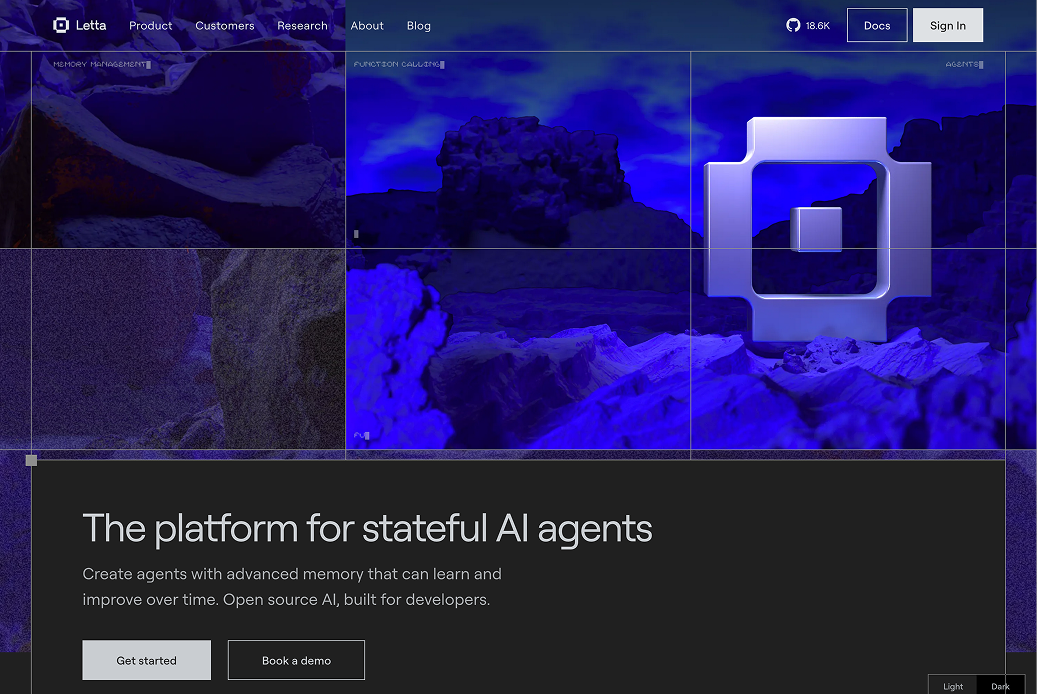Stateless chatbots are a dead end. Letta is the stateful agent platform built by the creators of the seminal MemGPT paper to solve the single biggest challenge in production AI: long-term memory. It provides the critical infrastructure—persistent memory, versioning, and a visual debugging environment—that allows you to move beyond simple, forgetful bots and build intelligent, adaptive agents that learn from every interaction.
Why Letta is the OS for Production Agents
Memory is the Product: Unlike other frameworks where memory is a bolted-on feature, Letta is architected around it. Using principles from the MemGPT research, it provides a sophisticated memory hierarchy that allows agents to manage infinite context, learn user preferences, and maintain state across weeks, months, or years of conversation. This is the difference between an agent that’s a tool and an agent that’s a partner.
The Agent Development Environment (ADE): From Black Box to Glass Box: Stop print() debugging your agents. Letta’s ADE gives you an unprecedented, real-time view into your agent’s “mind.” You can visually inspect the contents of its memory, trace the flow of information that led to a decision, and even manually edit its state. This level of observability is non-negotiable for debugging complex behavior and deploying agents to production with confidence.
Production-Grade from Day One: Letta is built for the realities of shipping software. Agent versioning allows you to safely roll out updates and instantly roll them back if something goes wrong. Agents are exposed as scalable REST APIs, ready to be integrated into any application. The entire platform is model-agnostic, meaning you can switch between OpenAI, Anthropic, or any other provider without losing your agents’ valuable, accumulated memory.
The Metrics That Define a Stateful Agent
- Development Velocity: Accelerate debugging and iteration by 3-5x with the visual Agent Development Environment.
- User Engagement: Increase long-term user retention by 40-60% with agents that remember and personalize their interactions.
- Reliability: Achieve 99.9%+ uptime for agentic systems with production-grade features like versioning and rollback.
- Strategic Flexibility: Migrate between LLM providers in minutes, not months, preventing vendor lock-in and optimizing for cost and performance.
Who Builds with Letta
The Ideal Customer Profile:
- Companies building AI agents as a core part of their product offering.
- Developers creating applications that require long-running, multi-session conversations.
- Teams that need to deploy reliable, observable, and maintainable agentic systems.
- Engineers who are frustrated by the limitations and “black box” nature of existing agent frameworks.
The Decision-Makers:
- AI and ML Engineers responsible for the core architecture of agent-based systems.
- CTOs and VPs of Engineering who need a stable, scalable, and future-proof platform for AI development.
- Product Managers designing next-generation, AI-powered user experiences.
- Technically-minded founders building an agent-first company.
Common Use Cases That Drive ROI
The Truly Personal AI Assistant: Build a customer support or personal coaching agent that remembers every past conversation. It knows the user’s history, preferences, and goals, allowing it to provide deeply contextual and effective assistance. This moves the user experience from transactional to relational.
The Collaborative Agent Team: Orchestrate a team of specialized agents that can collaborate on complex tasks. Letta’s persistent, shared memory allows a research agent to pass its findings to an analysis agent, which then hands off a summary to a writing agent, ensuring seamless context transfer at every step.
The Production-Ready AI Microservice: You’ve developed a powerful agent for a specific business process. With Letta, you can deploy it as a versioned, scalable, and secure REST API endpoint. Your core application can now call this agent like any other microservice, with the confidence that it can be updated, rolled back, and monitored just like the rest of your stack.
Critical Success Factors
The Pricing Reality Check:
- Open Source: A powerful, self-hostable version is available for free under an open-source license.
- Cloud Pricing:
- Free Tier: A generous free tier for developers to get started.
- Pro Plan: Starts at $25/month, designed for scaling applications.
- Enterprise: Custom pricing for teams that need advanced features, security, and dedicated support.
- The Value: The core value is in developer time saved. Building a robust, stateful memory and versioning system from scratch is a multi-month engineering effort. Letta provides it out of the box.
Implementation Requirements:
- A Developer-First Approach: Letta is a tool for engineers. While the ADE is visual, building with Letta requires a solid understanding of software development principles.
- Understanding Stateful Systems: To get the most out of Letta, you need to think about your agents in terms of state, memory, and long-term evolution, which is a different paradigm from simple, stateless API calls.
The Integration Ecosystem
A Hub for the Modern AI Stack: Letta is designed to connect, not replace.
- LLM Providers: Native support for OpenAI, Anthropic, and easily extensible to any other model provider.
- Developer Experience: First-class Python and Node.js SDKs, plus deep integration with the Vercel AI SDK.
- The Tool Ecosystem: Connect to any external tool or API, including pre-built integrations via MCP (Model Context Protocol) servers.
The Bottom Line
Letta provides the critical missing layer for production-grade AI: a robust, observable, and persistent memory system. It transforms agent development from an experimental art into a true engineering discipline. For any team that is serious about building agents that are more than just toys, Letta provides the foundational operating system to make it possible.
